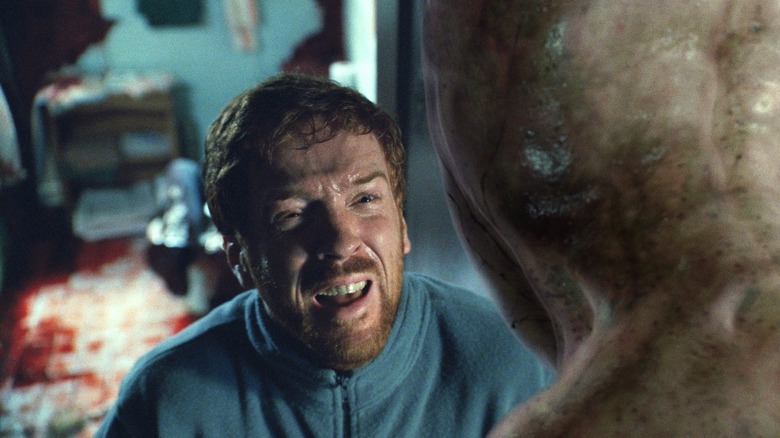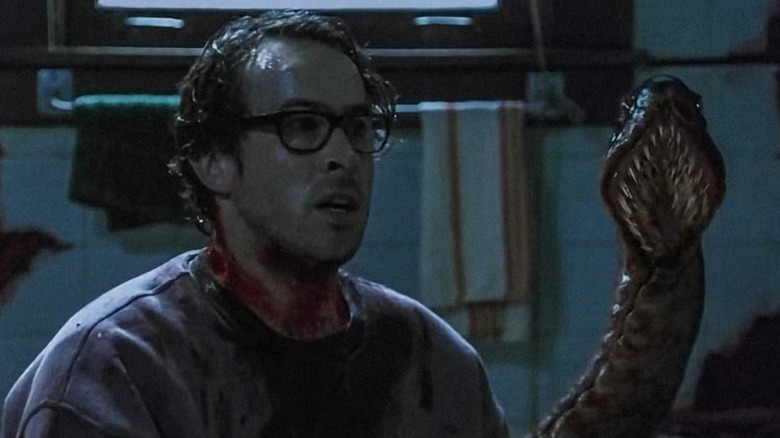Stephen King Wrote This Maligned Sci-Fi Novel After Someone Almost Killed Him
On June 19, 1999, Stephen King took a walk — and almost died.
The best-selling writer had gotten into a habit of taking long walks every day, strolling along Route 5 in Maine, "a two-lane blacktop highway that runs between Bethel and Fryeburg," as King described it. While King was walking on that particular June day, a blue van was approaching him, swerving wildly all over the road. Here's what happened next, in King's own words:
"Most of the sight lines along the mile-long stretch of Route 5 that I walk are good, but there is one place, a short steep hill, where a pedestrian heading north can see very little of what might be coming his way. I was three-quarters of the way up this hill when the van came over the crest. It wasn't on the road; it was on the shoulder. My shoulder. I had perhaps three-quarters of a second to register this. It was just time enough to think, My God, I'm going to be hit by a school bus, and to start to turn to my left. Then there is a break in my memory. On the other side of it, I'm on the ground, looking at the back of the van, which is now pulled off the road and tilted to one side."
King found himself lying in a ditch with blood on his face and pain in his right leg. "I look down and see something I don't like: my lap appears to be on sideways, as if my whole lower body had been wrenched half a turn to the right," King said. King had been struck by the van, which belonged to a man named Bryan Edwin Smith. Smith had apparently been distracted by his dog moving around in the back of the van when he hit King, who flew off the road and into the ditch. King could've been killed, but he was lucky, or as lucky as anyone who gets hit by a van can be. The accident left him with a collapsed right lung, numerous right leg fractures, a scalp laceration, and, just to top it all off, a broken hip.
'My God, I'm a junkie again'
For years, King had struggled with addiction, to booze and cocaine — and other things, too. "I was an addictive personality, period," he told NPR. "I was smoking two packs of cigarettes a day. I loved Listerine. I loved NyQuil. You name it. Boy, if it would change your consciousness, I was all for that." King's addictions were so bad that he has gone on record as saying (in his non-fiction book "On Writing") that he "barely remembers writing" his killer dog novel "Cujo," thanks in part to being blitzed out of his mind on alcohol. But King got his act together and got sober, kicking drugs and drink.
And then the accident happened.
"[S]uddenly, you wake up in a hospital bed and you've got a phenyltol patch on your arm and you're jacked up on morphine and you've got all these different medications," King told NPR. "I was as grossed out by that, I think, as I was by the injuries, thinking, 'My God, I'm a junkie again.'" King is nothing if not prolific, so eventually, he got back to writing as he recuperated, although he found sitting at his desk painful. During his recovery from his injury he would work on both his non-fiction book "On Writing," and complete a big novel, titled "Dreamcatcher."
When "Dreamcatcher" hit bookshelves in 2001, there was a lot of attention, both because it was a new novel from a popular writer, and because it was King's first novel since he almost got killed on Route 5. It should've been a moment of triumph — King was back, baby! Unfortunately, his big return wasn't very good — and even King himself admits that now.
'I don't like Dreamcatcher very much'
"Dreamcatcher" mostly plays out like King is borrowing ideas from other works of fiction, including his own. "Alien" is clearly a big influence on the story, which is about alien creatures that incubate inside human bodies and then burst forth to be born. But unlike the Xenomorph in "Alien," which explodes out of a human's chest, the otherworldly creatures in "Dreamcatcher" spring forth from ... uh ... the anus. Yes, that's right, people literally crap out aliens in this story, to the point where the creatures get the nickname "s***-weasels." King also goes ahead and names the main (human) villain of the story Colonel Kurtz, which is, of course, the name of Marlon Brando's character in "Apocalypse Now." And just to top it all off, King also seems to be rewriting one of his very best novels, "It." Just like "It," "Dreamcatcher" is set in the fictional town of Derry, Maine. And just like "It," it's also about a group of friends who formed a strong bond as children and then reunite as adults.
"Dreamcatcher" isn't very good. Sure, it has its moments: King is a very good writer, and he always manages to turn a memorable phrase or two. There's also a section of the book that deals with one of the main characters surviving being struck by a vehicle, which allowed King to channel his near-death experience onto the page. Still, the book is ultimately disappointing, and King, to his credit, has since admitted as much. "I don't like 'Dreamcatcher' very much," he told to Rolling Stone. As King tells it, his sudden return to drugs following the accident played a part in the book's failures: "I was using a lot of Oxycontin for pain. And I couldn't work on a computer back then because it hurt too much to sit in that position. So I wrote the whole thing longhand. And I was pretty stoned when I wrote it, because of the Oxy, and that's another book that shows the drugs at work."
"Dreamcatcher," like most King novels, was eventually turned into a movie. Believe it or not, the movie is actually worse than the book, despite having renowned screenwriter William Goldman on board.


